

Educators not leaving 'Rethinking ICT' to politicians. Forget top-down.
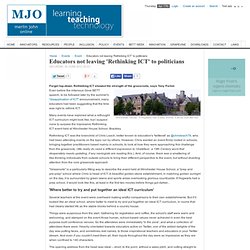
Rethinking ICT showed the strength of the grassroots, says Tony Parkin Winchester House: 'If Hogwarts had a prep school, it would look like this' Even before the infamous Gove BETT speech, to be followed later by the summer's "disapplication of ICT" announcement, many educators had been suggesting that the time was right to rethink ICT. Many events have explored what a rethought ICT curriculum might look like, but I suspect none to surpass the impressive Rethinking ICT event held at Winchester House School, Brackley.
The Flipped Classroom: The Full Picture for Tinkering and Maker Education. If you have been following my blog series on The Flipped Classroom: The Full Picture, you know that I am using this opportunity, given all the press on flipped classroom, to discuss a model of teaching and learning based on experiential education.
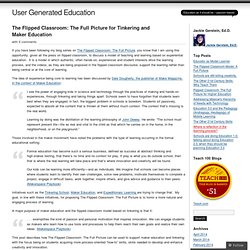
It is a model in which authentic, often hands-on, experiences and student interests drive the learning process, and the videos, as they are being proposed in the flipped classroom discourse, support the learning rather than being central or at the core of learning. The idea of experience being core to learning has been discussed by Dale Dougherty, the publisher of Make Magazine, in the context of Maker Education: I see the power of engaging kids in science and technology through the practices of making and hands-on experiences, through tinkering and taking things apart. Schools seem to have forgotten that students learn best when they are engaged; in fact, the biggest problem in schools is boredom. Experiential Engagement: The Activity. High-tech vs. no-tech: D.C. area schools take opposite approaches to education. In the same week, about a dozen miles away, another set of sixth-graders is on a similar lesson.
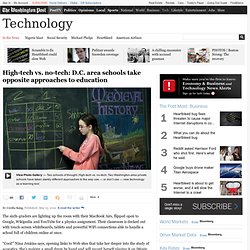
High-tech vs. no-tech: D.C. area schools take opposite approaches to education. In the same week, about a dozen miles away, another set of sixth-graders is on a similar lesson.
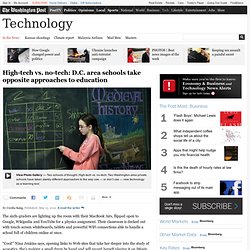
Only they are in a spare, birch-hued classroom that looks like a throwback to the Norman Rockwell era. There are no computers here. Mobile Learning and The Flipped Classroom: The Full Picture. I have jumped onto the Flipped Classroom craze to take the opportunity to propose and discuss an experiential model of education (ala John Dewey and Kurt Hahn), one that has experience at its core and provides learning options for all types of learners.
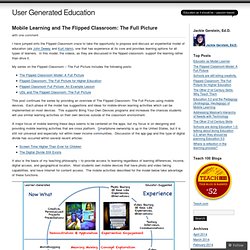
In this model, the videos, as they are discussed in the flipped classroom. support the learning rather than drive it. My series on the Flipped Classroom – The Full Picture includes the following posts: This post continues the series by providing an overview of The Flipped Classroom: The Full Picture using mobile devices. Each phase of the model has suggestions and ideas for mobile-driven learning activities which can be implemented on most devices. This supports Bring Your Own Devices programs and increases the chances students will use similar learning activities on their own devices outside of the classroom environment.
Factory of the Tutor. A platform for integrating ICT in education. Platform integrating ICT in the teaching-learning process We work to create the tools necessary to incorporate ICT into education and methodological strategies generate value-added.
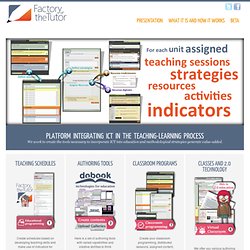
Teaching schedules Create schedules based on developing teaching skills and make use of indicators for evaluation, you have a complete editor for this. Authoring Tools Here is a set of authoring tools with varied capabilities and creative abilities to think autoevaluables content and activities. Classroom programs Create your classroom programming, distributed sessions, assigned content, activities and methodologies to each, and includes multiple resources and indicators including. Classes and 2.0 Technology We offer you various authoring tools to help you make use of ICT, and manage your classes and students. We work to create the tools necessary to incorporate ICT in education and innovative methodological strategies generate added value. History. How Has Internet Changed Education? How has internet changed education infographic from SEO.com explores what kind of impact the Internet has on education.
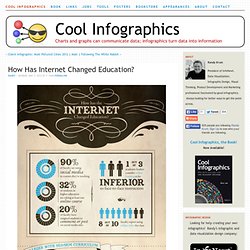
It's Time for a New Kind of High School. Survey reveals schools unprepared to support digital learning. A recent nationwide survey by JogNog.com Reveals that 93% of teachers would assign online games in class if the subject matter matched their curriculum.
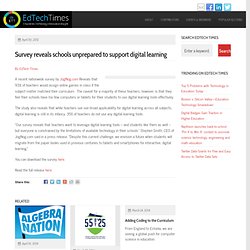
The caveat for a majority of these teachers, however, is that they feel their schools have too few computers or tablets for their students to use digital learning tools effectively. The study also reveals that while teachers see see broad applicability for digital learning across all subjects, digital learning is still in its infancy. 35% of teachers do not use any digital learning tools. Flipped Classroom: The Full Picture for Higher Education « User Generated Education. The Flipped Classroom, as most know, has become quite the buzz in education.
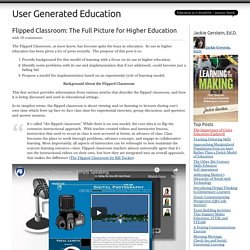
Its use in higher education has been given a lot of press recently. The purpose of this post is to: Provide background for this model of learning with a focus on its use in higher education.Identify some problems with its use and implementation that if not addressed, could become just a fading fad.Propose a model for implementation based on an experiential cycle of learning model.
Background About the Flipped Classroom This first section provides information from various articles that describe the flipped classroom, and how it is being discussed and used in educational settings. Kids Speak Out on Student Engagement. A while back, I was asked, "What engages students? " Sure, I could respond, sharing anecdotes about what I believed to be engaging, but I thought it would be so much better to lob that question to my own eighth graders. The Naace Curriculum - An ICT Framework. The Naace curriculum area is the place to find all the latest updates to the Naace Curriculum Framework.
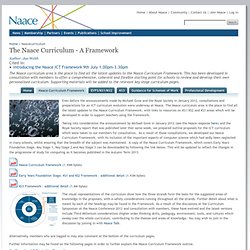
This has been developed in consultation with members to offer a comprehensive, coherent and flexible starting point for schools to review and develop their own personalised curriculum. Supporting materials will be added to the relevant key stage curriculum pages. Flipped Classroom: Beyond the Videos. Last week, I read an interesting blog post by Shelley Blake-Plock titled “The Problem with TED ed.”
It got me thinking about the flipped classroom model and how it is being defined. As a blended learning enthusiast, I have played with the flipped classroom model, seen presentations by inspiring educators who flip their classrooms, and even have a chapter dedicated to this topic in my book. However, I am disheartened to hear so many people describe the flipped classroom as a model where teachers must record videos or podcasts for students to view at home. There are many teachers who do not want to record videos either because they don’t have the necessary skills or equipment, their classes don’t include a lot of lecture that can be captured in recordings, or they are camera shy. Too often the conversation surrounding the flipped classroom focuses on the videos- creating them, hosting them, and assessing student understanding of the content via simple questions or summary assignments.
Common Sense Tips for Digital Generation Parents. Tel.ac.uk. Main Page - Teaching Open Source. How Tech Will Transform the Traditional Classroom. Ben Jackson is a writer and app developer living in Brooklyn, NY. He likes clean typography, dirty language, strong coffee, apple pie and comfortable chairs, and he writes about his obsessions at 90WPM. Loticonnection.cachefly.net/global_documents/LoTiTurnsUpTheHEAT.pdf. Www.prn.bc.ca/ts/wp-content/LoTi_Framework_Sniff_Test.pdf. Technology Integration Matrix. Of internet 2010 - AAAS paper-1.pdf. Edorigami.wikispaces.com/file/view/bloom's+Digital+taxonomy+v3.01.pdf. Learning theories & eLearning. E-Learning Roadmap. CEMP Conversations » heppell. Technology and Young Children. Key Messages When used intentionally and appropriately, technology and interactive media are effective tools to support learning and development.
Intentional use requires early childhood teachers and administrators to have information and resources regarding the nature of these tools and the implications of their use with children. Limitations on the use of technology and media are important. Special considerations must be given to the use of technology with infants and toddlers. Attention to digital citizenship and equitable access is essential. What are e-Portfolios? An e-portfolio is a purposeful aggregation of digital items – ideas, evidence, reflections, feedback etc, which ‘presents’ a selected audience with evidence of a person’s learning and/or ability.Sutherland and Powell (2007) Keri Facer - Learning Futures. Education for the Apocalypse? Answers to your ‘flipped school’ questions. By Greg Green, Special to CNN. Talks. Noam Chomsky - The Purpose of Education.
High school students know that their learning isn’t relevant. What’s the Point of Education? - Independent Thinking from Independent Thinking. Free Online Lesson Planbook Software for Teachers. Designing Schools for 21st Century Learning. Bridge to Learning - Educational Research. The fundamental model of school education is still a teacher talking to a group of pupils. Redlands College iPad Portal. Articles - Educational Technology - ICT in Education. Two great quotes about education technology. ICT_Seven_Proficiencies.pdf (application/pdf Object) Lessons taught in 3D help children learn more and behave better as it increases levels of concentration. By Gareth Finighan Updated: 21:00 GMT, 6 January 2012.
Technology Integration Matrix. The Dos and Don'ts of Tech Integration PD.